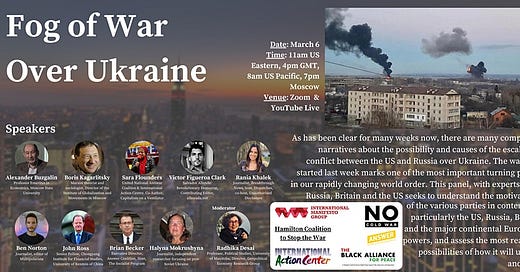I use the term “global Left” to refer to intellectuals and activists from all regions of the world whose conception of socialism has been shaped by the socialist projects of the Third World plus China. The global Left is a current of thought in the Western Left, which is divided with respect to the conflict in Ukraine. Some in the Western Left view the conflict as an inter-imperialist conflict between U.S. and Russian imperialisms. But the global Left sees the conflict as a manifestation of a conflict between Western imperialism and anti-imperialist forces, as is illustrated by the support of the socialist nations of the global South for the Russian military operation in Ukraine.
The March 6 Webinar, “The Fog of War over Ukraine,” organized by the International Manifesto Group, was for the most part an exchange that was moving toward consensus on the position of the global Left with respect to Ukraine, except for a few comments outside the consensus, which were received wi…


